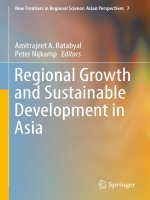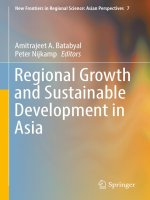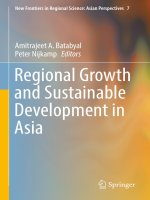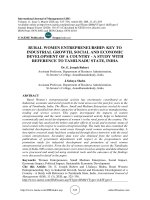Economic growth and economic development 540
Bạn đang xem bản rút gọn của tài liệu. Xem và tải ngay bản đầy đủ của tài liệu tại đây (79.32 KB, 1 trang )
Introduction to Modern Economic Growth
11.5. Taking Stock
This chapter ends our investigation of neoclassical growth models. It also opens
the way for the analysis of endogenous technological progress in the next part of the
book. The models presented in this chapter are, in many ways, more tractable and
easier than those we have seen in earlier chapters. This is a feature of the linearity
of the models (most clearly visible in the AK model). This type of linearity removes transitional dynamics and leads to a more tractable mathematical structure.
Linearity, of course, is an essential feature of any model that will exhibit sustained
economic growth. If strong concavity sets in (especially concavity consistent with
the Inada conditions as in Assumption 2), sustained growth will not be possible.
Therefore, (asymptotic) linearity is an essential ingredient of any model that will
lead to sustain growth. The baseline AK model and its cousins make this linear
structure quite explicit. While this type of linearity will be not as apparent (and
often will be derived rather than assumed), it will also be a feature of the endogenous technology models studied in the next part of the book. Consequently, many
of these endogenous technology models will be relatively tractable as well. Nevertheless, we will see that the linearity will often result from much more interesting
economic interactions than being imposed in the aggregate production function of
the economy. There is another sense in which the material in this chapter does not
do justice to issues of sustained growth. As the discussion in Chapter 3 showed,
modern economic growth is largely the result of technological progress. Except for
the Romer model of Section 11.4, in the models studied in this chapter do not feature
technological progress. This does not imply that they are necessarily inconsistent
with the data. As our discussion in Chapter 3 indicated there is a lively debate
about whether the observed total factor productivity growth is partly a result of
mismeasurement of inputs. If this is the case, it could be that much of what we
measure as technological progress is in fact capital deepening, which is the breadand-butter of economic growth in the AK model and its variants. Consequently,
the debate about the measurement of total factor productivity has important implications for what types of models we should use for thinking about world economic
growth and cross-country income differences.
526









